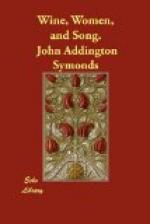When the girls drew nigh the
grove,
Some fear came
upon them;
Further as they fared, the
charm
Of the pleasance
won them;
All the birds so sweetly sang
That a spell was
on them,
And their bosoms warmed with
love
At the welcome
shown them.
Man would be immortal if
He could there
be dwelling:
Every branch on every tree
With ripe fruit
is swelling;
All the ways with nard and
myrrh
And with spice
are smelling:
How divine the Master is
All the house
is telling.
Blithesome bands arrest their
gaze,
Youths and maidens
dancing;
Bodies beauteous as the stars,
Eyes with heaven’s
light glancing
And the bosoms of the girls,
At the sight entrancing,
Leap to view such marvels
new,
Joy with joy enhancing!
They their horses check, and
light,
Moved with sudden
pleasure;
Half forget what brought them
here,
Thralled by love
and leisure;
Till once more the nightingale
Tuned her thrilling
measure;
At that cry each girl again
Hugs her hidden
treasure.
Round the middle of the grove
Was a place enchanted,
Which the god for his own
rites
Specially had
planted;
Fauns and nymphs and satyrs
here
Flowery alleys
haunted,
And before the face of Love
Played and leaped
and chaunted.
In their hands they carry
thyme,
Crowns of fragrant
roses;
Bacchus leads the choir divine
And the dance
composes;
Nymphs and fauns with feet
in tune
Interchange their
posies;
But Silenus trips and reels
When the chorus
closes.
On an ass the elder borne
All the mad crew
guideth;
Mirth and laughter at the
view
Through Love’s
glad heart glideth.
“Io!” shouts the
eld; that sound
In his throat
subsideth,
For his voice in wine is drowned,
And his old age
chideth.
’Mid these pleasant
sights appears
Love, the young
joy-giver;
Bright as stars his eyes,
and wings
On his shoulders
shiver;
In his left hand is the bow,
At his side the
quiver;
From his state the world may
know
He is lord for
ever.
Leans the boy upon a staff
Intertwined with
flowers,
Scent of nectar from his hair
Breathes around
the bowers;
Hand in hand before him kneel
Three celestial
Hours,
Graces who Love’s goblet
fill
From immortal
showers.
It would surely be superfluous to point out the fluent elegance of this poem, or to dwell farther upon the astonishing fact that anything so purely Renaissance in tone should have been produced in the twelfth century.




